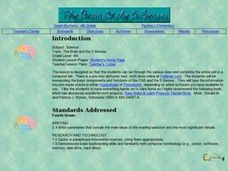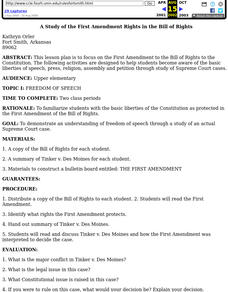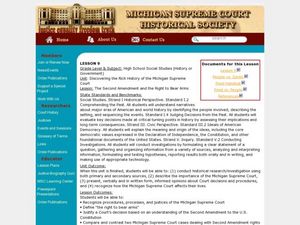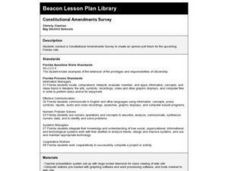Constitutional Rights Foundation
Naturalized Citizens and the Presidency
Article II, Section 1 of the U.S. Constitution takes center stage in a lesson that asks class members to assume the role of state senators, debate a resolution to amend the U. S. Constitution to permit naturalized citizens to run for...
Social Media Toolbox
Why Social Media?
Is social media the best way to convey news in your school? Young journalists dig deep into the social media question in the second of 16 lessons from The Social Media Toolbox. After learning about the relationship between social media...
State Bar of Texas
Roe v. Wade
At what point does the right of privacy end and the government begin? Scholars research rights under the Ninth Amendment to the Constitution. Using the 1973 Roe v. Wade Supreme Court case as a starting point, along with small group work...
State Bar of Texas
Mapp v. Ohio
Do you have a search warrant? Scholars investigate the concept of illegal search and seizure through the eyes of the Supreme Court case Mapp v. Ohio. A short video clip along with paired group work opens discussion on the concept of how...
School Improvement in Maryland
Affirmative Action
Do the government's affirmative action policies promote equity in the United States? The Fourteenth Amendment to the US Constitution and affirmative action policies come under scrutiny in an activity that asks class members to...
State Bar of Texas
Wisconsin v. Yoder
How far does freedom of religion truly go? The 1972 Supreme Court case Wisconsin v. Yoder introduces the concept of the free exercise clause of the First Amendment. Individuals examine the case with a short video and open discussion. To...
State Bar of Texas
Tinker v. Des Moines
Freedom of speech allows anyone, even those in school, to say and do what they feel—right? The 1969 Supreme Court case Tinker v. Des Moines serves as the backdrop for a study on First Amendment rights. Scholars use a short video along...
Anti-Defamation League
Women's Suffrage, Racism, and Intersectionality
The Nineteenth Amendment granted women the right to vote—as long as they were white. High schoolers read articles and essays about racism in the suffrage movement and consider how intersectionality played a role in the movement. Scholars...
Curated OER
A Short, Short Lesson on the Fourth Amendment
Learners examine Fourth Amendment protections and explore amendment situations involving young people. After discovering the historic background for the creation of the Fourth Amendment, students role-play various situations involving...
Curated OER
First Amendment Rights
Fifth graders participate in a problem-solving and decision-making process involving the First Amendment rights to analyze and implement a solution for a school-related issue. They are given a variety of scenarios to apply the First...
Curated OER
Women's Suffrage: Examining Both Sides of the Issue
Eighth graders reflect on the main ideas behind Women's Suffrage. In this history lesson, 8th graders discuss the pros and cons in relation to Women's Suffrage and the 19th Amendment, then divide into small groups to complete...
National First Ladies' Library
How a Bill Becomes a Law
High schoolers engage in the democratic process and to learn how a bill become a law. Then they write a bill they would like as law in their classroom. Learners also form committees that will review the list of bills to determine if they...
Media Smarts
You Be the Editor
Look at different case studies to discuss the ethics of journalism. Twelve real-life events are written up and your learners get to be the editors. Encourage your class to think about the implications of publishing decisions. After each...
iCivics
The “Supreme” in Supreme Court
Does a public school have the right to restrict what t-shirts students wear? Discover what happened when this question was brought to the Supreme Court, and review other major cases in United States history involving judicial review....
Curated OER
U.S. History: Our Constitutional Amendments
Eighth graders conduct Internet research about Constitutional Amendments and present oral reports on their findings. Their reports also include visual representations depicting their chosen amendment's focal point. Students discuss the...
Curated OER
A Study of the First Amendment Rights in the Bill of Rights
Students become aware of the basic liberties of speech, press, religion, assembly and petition through study of Supreme Court cases. Student groups analyae some cases heard by the Supreme Court to further their understanding of the First...
Curated OER
Amendment Process
Eighth graders examine the current amendments and discuss any change they would like to make. With a partner, they develop a proposal and an advertisement to redo at least two amendments. They also compare and contrast the amendments...
Curated OER
First Amendment or Treason?
Students investigate the meaning of the First Amendments right of freedom of speech. They examine the anti-war movement that occurred during the 1960's in response to the war in Vietnam. While studying primary sources, they determine how...
Curated OER
The Second Amendment and the Right to Bear Arms
Students examine procedures and processes of the Michigan Supreme Court. They explain the Second Amendment to others. They compare and contrast two cases dealing with the Second Amendment.
Curated OER
Right of Privacy: 4th Amendment
Learners are introduced to the 4th Amendment of the Washington state Constitution. In groups, they examine the Constitution of the state of Washington and compare it to the United States Constitution. They role play the role Supreme...
Curated OER
Constitutional Amendments Survey
Young scholars conduct Constitutional Amendments Survey to create an opinion poll forum.
Curated OER
Reconstruction (1865-1876)
Easily broken into pieces for several class sessions, this presentation is a great way to transition your class out of a Civil War unit and closer to the 20th century. Engaging photographs, including relevant maps and humorous political...
Administrative Office of the US Courts
Cox v. New Hampshire
Staging a debate is a great way to class members to think deeply about issues, especially those related to rights guaranteed by the US Constitution. The Supreme Court case, Cox V. New Hampshire, focuses on the First Amendment's...
National Constitution Center
Writing Rights: The Bill of Rights
Where did the cherished ideals enshrined in the Bill of Rights originate? While history gives the Founding Fathers much of the credit, laws in colonial America influenced the Bill of Rights. An interactive web-based activity allows...
Other popular searches
- Constitutional Amendments
- Reconstruction Amendments
- First Ten Amendments
- Amendments u.s. Constitution
- Teaching the Amendments
- Ten Amendments
- 8th and 14th Amendments
- 13th, 14th, 15th Amendments
- 26 Amendments
- Us Constitution Amendments
- 10 Amendments
- 13th 14th 15th Amendments

























